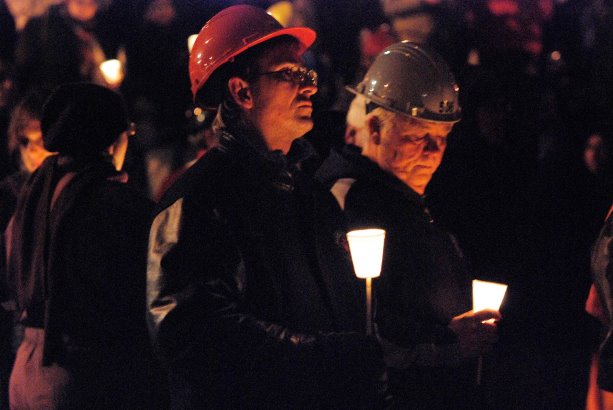The project manager overseeing the fatal swing stage which collapsed on Christmas Eve 2009, killing four men and injuring a fifth, will be sentenced in a Toronto courtroom today and the Crown is pressing for 15 years in jail.
This past June Vadim Kazenelson was found guilty of four counts of criminal negligence causing death and one count of criminal negligence causing bodily harm in the deaths of four coworkers and the injury of a fifth. The court has already ruled that mechanical failure and negligence caused the incident.
While a jail term of 15 years would be unprecedented in a construction site incident, it’s in line with amendments to the Criminal Code around worker safety which makes companies, owners and key players liable.
"The maximum penalty for criminal negligence causing death is actually the same as murder," said Toronto lawyer Norm Keith of Fasken Martineau DuMoulin who specializes in construction law. "It’s life in prison. In murder, the intent has to be shown that you planned it, for example, waiting outside someone’s house and then following them and shooting them. In criminal negligence, the intent is that you had a wanton and reckless disregard for human life."
Ironically, Kazenelson was on the 40-foot long swing stage, 13-storeys up, when it split in two, sending the four victims to their deaths. A fifth man fell and was seriously injured while Kazenelson managed to hang on and a seventh was wearing fall arrest gear and hung suspended until help came.
In his decision convicting Kazenelson, Justice Ian MacDonnell noted: "The defendant (Kazenelson) noticed that only two lifelines were in place. He raised the issue with the site supervisor but took no action after the supervisor (Fayzullo Fazilov) said: ‘Don’t worry about it.’"
None of the five men who fell, four of whom were killed, were wearing fall arrest equipment.
"The risk of serious harm was foreseeable, (Kazenelson) had adverted to that risk, and he failed to act," MacDonnell wrote. "Accordingly, I am satisfied beyond a reasonable doubt that Mr. Kazenelson was criminally negligent."
Aleksey Blumberg, 33, had been in Canada only four years and was newly married; Alesandrs Bondarevs, 24, had been here since 2002 and lived with his parents and was planning to go back to school; Vladamir Korostin, 40, had been in Canada only two years and had two daughters, six- and 14 years old at the time. He had planned to spend Christmas reconciling with his wife.
Site supervisor Fazilov, 31, had also only been in Canada two years, while his wife and their two- and seven-year-old children, elderly parents and four sisters, lived in Uzbekistan where he provided for them.
Shohruh Tojiddinov was wearing a secured harness and hung suspended. He testified Kazenelson didn’t insist on everyone wearing the gear and after the incident asked him to lie about it.
Dilshod Marupov, another Uzbekistanian, was injured when he hung on to the swing stage after the collapse. He had no work permit and was a friend and roommate of Fazilov who had invited him to work on the project. He had been on the job only two days.
As new Canadians, none of the crew had much in the way of assets in Canada and none had life insurance, though there have since been settlements from the Workplace Safety and Insurance Board (WSIB).
As MacDonnell noted, "subsequent examination of the swing stage concluded that some of its welds were cracked and/or deficient and its design was faulty. A proper inspection would have revealed some of these defects. It was the site supervisor’s responsibility to conduct a daily inspection."
According to an agreed statement of facts entered in 2012, it was Fazilov’s negligence which also brought an admission of guilt from the company, Metron Construction and its president and sole shareholder Joel Swartz who had personally been fined $90,000.
At that trial the Crown pressed for a fine of $1 million against the company calling the incident "totally preventable" but the lower court held it could bankrupt Metron and Swartz.
The company was initially fined a total $342,000 in 2012 and, on appeal, those fines jumped to $750,000 in 2013. The swing stage supplier, Swing N Scaff Inc. of Ottawa was also fined $350,000 for failing to ensure the platform was in good condition.
The court found that in September 2009 Metron was contracted to restore concrete balconies on two high-rise buildings at Kipling Avenue in Toronto with a completion date of Nov. 30, 2009.
There were delays getting started and Metron was offered a $50,000 bonus to wrap it up by the end of December 2009. To speed up progress Swartz leased two more swing stages from Swing N Scaff, in addition to the equipment already on-site, because every supplier in the GTA was out of inventory.
These were described as four, 10-foot long modules bonded by plates and bolts. Though they appeared new, they had no tags or serial numbers or any markings as to capacity or anything else as required by Ontario’s Occupational Health and Safety (OHS) legislation and industry practice. It was rated at a capacity of 1,800 kg. and the seven men and their tools were over that limit.
The court heard Metron did make sure some basic safety precautions were taken and ensured that Kazenelson and Fazilov took instructors and operator’s courses. Also, the rigs were inspected and there were periodic safety meetings and safety manuals handed out to the crew.
The arrival of the Ottawa rigs, however, was the fatal twist in the story.
"The two swing stages arrived without any manual, instructions, design drawings, or other product information," court documents state. "There was no report in writing by a professional engineer stating that the swing stage had been erected in accordance with design drawings, as required by O. Reg. 213/91, s. 139(5) enacted under the Occupational Health and Safety Act, R.S.O. 1990, c. O. 1 (OHSA)."
Those swing stages were assembled and installed by the crew under Fazilov and Kazenelson’s direction.
On the fateful day about 4:30 p.m. with the winter light fading fast, the seven men and their tools — instead of the usual two — boarded the swing stage on the 13th floor.
The incident was a tragedy and a wake up call to the industry and Ontario OHS which is now reviewing the regulations for swing stages and expects to enact changes which include raised expectations for design, labeling and testing by the end of 2015 or early 2016.

1/3
Photo:
2/3
Photo:






Recent Comments
comments for this post are closed